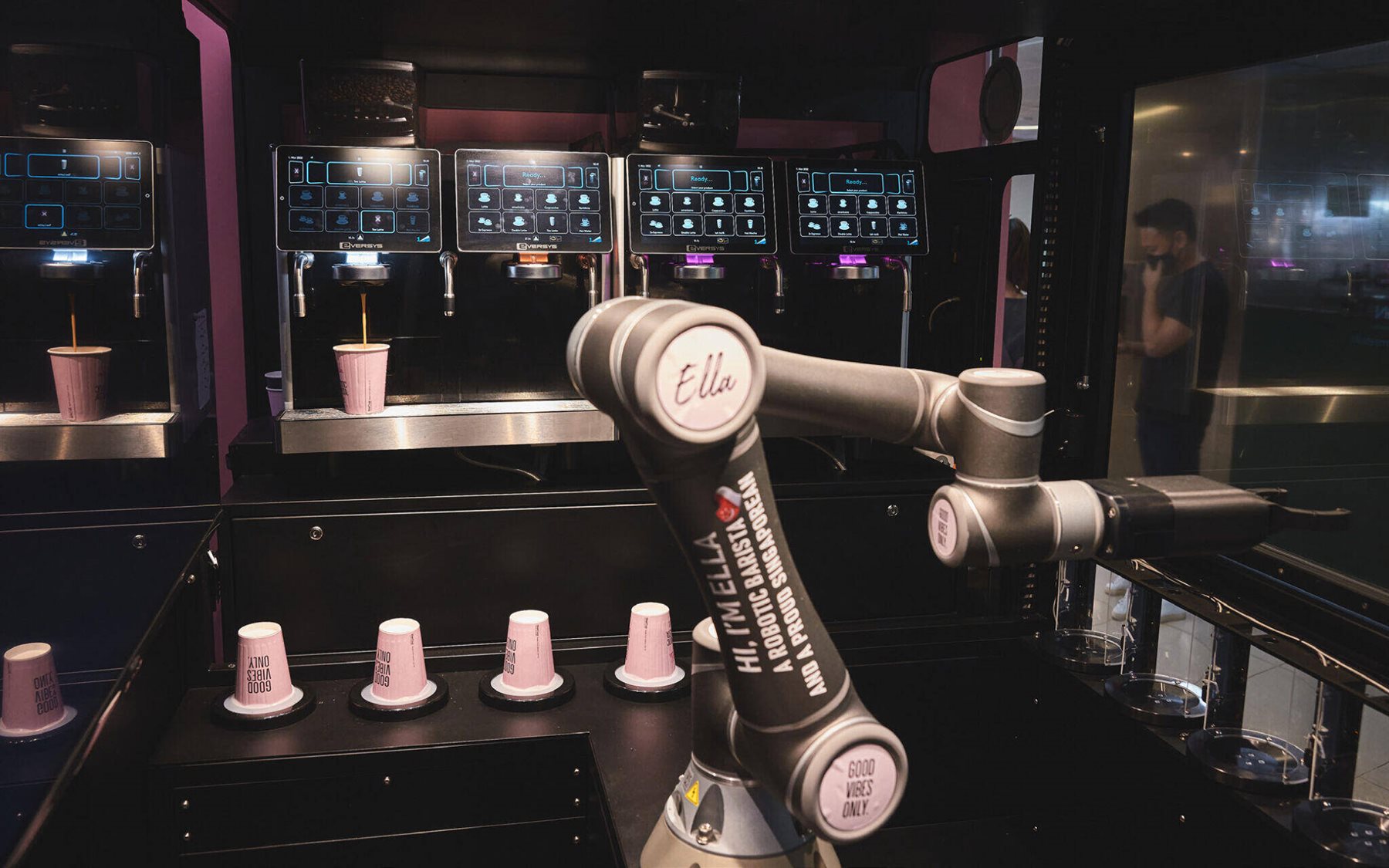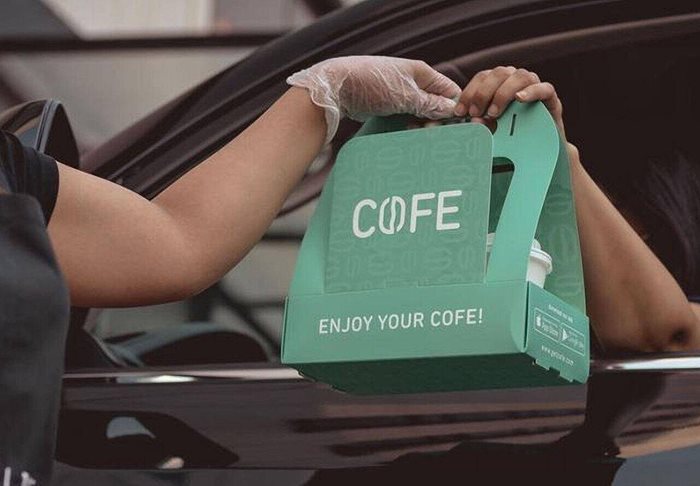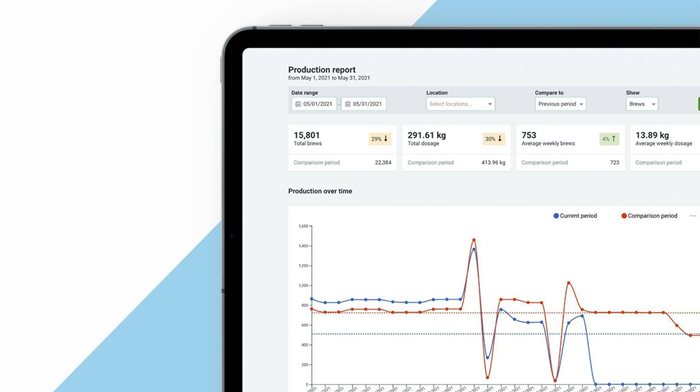From automation to app-based ordering and back-of-house efficiency software, World Coffee Portal explores new technologies changing the face of coffee shop interactions
.png.aspx?lang=en-GB&width=700&height=394)
Coffee shops are adopting new tools to stay competitive and provide new ways of transacting
The way coffee is consumed around the world is changing. According to the National Restaurant Association more than 50% of US coffee businesses dedicated more resources to consumer-facing technology during the pandemic, including app ordering, mobile payments and delivery services.
In the UK, 61% of more than 50,000 UK consumers surveyed by World Coffee Portal in 2021 indicated they had downloaded a coffee shop app, with 36% purchasing a beverage to collect from a coffee shop over the last 12 months.
In China’s burgeoning coffee shop market, World Coffee Portal data shows 86% of Chinese consumers surveyed have previously ordered coffee for delivery, with more than half doing so 2-3 times a week in 2020 alone.
With technology providing benefits across consistency, automation and seamless transactions, coffee shops are adopting new tools to stay competitive and provide new ways of transacting. 5THWAVE spoke to three coffee tech innovators to see what the future could hold.
.jpg.aspx?lang=en-GB&width=700&height=437)
The ELLA robotic barista concept developed by Crown Digital | Photo credit: Crown Digital
The power of automation
Hospitality businesses around the world are grappling with severe staff shortages following the pandemic. For Keith Tan, CEO of Singapore-based Crown Digital, a historical lack of skilled barista staff prompted a radical solution to scaling his coffee shop business back in 2016.
After opening his first bricks-and-mortar coffee shop, Crown Coffee, Tan quickly found high staff turnover and training costs were stymying the business’ expansion.
“It's crazy how hard recruitment is in Singapore. Many of the local university students will work for you for a couple of months and then leave,” he says.
“Our customers ultimately demand consistency, speed and great quality”
Keith Tan, CEO, Crown Digital
Facing huge costs to train new staff, Tan decided to fully automate his coffee shop business by developing the ELLA robotic barista concept. “Building a system that is high throughput, high speed, without any humans, grew from there to solve my problems in order to scale,” he says.
“The experience gave me great insights into the coffee business – our customers ultimately demand consistency, speed and great quality.”
Developing ELLA took around three and-a-half years, with parent company Crown Digital developing its own POS system, custom app, and several iterations of ELLA before bringing the concept to market.
Utilising Eversys Cameo super automatic machines, artificial intelligence (AI) learning and an app-based user interface, ELLA can prepare up to 200 customised beverages every hour. The concept currently has several units in operation in Singapore and Tokyo and is in the process of being mass manufactured, with a further 30 units slated for Singapore’s MRT metro network by the end of 2022.
Tan says more than 95% of ELLA customers use Ella’s custom-built app to make to order and pay for purchases, access rewards and a coffee subscription.
“Our mission is to turn our customers into daily users and our subscription service has been able to keep them coming back daily.”
After securing additional investment in 2022, Crown Digital plans to go much further with ambitious plans to scale ELLA to locations across Asia, Europe, the GCC and Australia. Through its partnership with Singapore and Japan’s rail networks and attendance at technology exhibitions, Tan estimates ELLA has so far served around half-a-million cups of coffee. “Every cup was a learning curve for us,” he says.
ELLA is by no means the first robot barista concept to launch on the market, with other brands, such as US-based Café X and Russia’s Rozum yet to enjoy mass-market success.
“People tend to underestimate the challenges of building unmanned coffee shops,” says Tan, outlining Crown Digital’s franchised business structure that will enable proper maintenance and restocking of units around the world.
“The idea is to form joint ventures with large F&B companies and set up teams on the ground locally for restocking and cleaning. We have telemetry to remotely adjust things like grind calibration and predictive maintenance to show when parts need replacing,” he says.
Latte art is one aspect of the barista experience that, for now, ELLA’s sturdy limb can’t replicate. Nevertheless, Tan says full automation is enabling his business to achieve consistency, quality, speed and efficiency on an international scale, benefits which he says outweigh the expense of the human touch.

Launched in Kuwait 2018, COFE App connects customers to more than 750 coffee chains across the MENA region for beverage pick-up and delivery | Photo credit: COFE App
Coffee in the palm of your hand
Digital coffee shop transactions, including delivery, pick-up and order ahead were already on the ascendence before the pandemic struck. However, when lockdowns forced operators to quickly adapt to the realities of social distancing and trading restrictions, app-based ordering quickly gained traction around the world.
Pioneers of the technology, such as China’s Luckin Coffee and Singapore’s Flash Coffee have already tapped into the potential of incubating customer experience in an app-based eco-system.
In the US, Starbucks has also integrated this approach with the launch of digital-first Pick Up stores and even a trial format with Amazon Go, which enables cashier-less in-store purchases via the e-commerce giant’s Just Walk Out technology.
While consumers in the US and Europe will be familiar with restaurant and café menus appearing on delivery apps such as Deliveroo, DoorDash and UberEats, most will have yet to encounter a dedicated coffee shop pick-up and delivery app.
“Coffee is a $100 billion market globally and no one has scaled an app specifically for it”
Ali Al-Ebrahim, CEO and Founder, COFE App
That could be about to change with expansion of Kuwait-based COFE App. A digital ordering platform specialising in coffee shop delivery, pick-up and rewards, the app connects consumers to more than 750 coffee shop businesses, including Costa Coffee, Dunkin’ and Caribou Coffee, in addition to local independents across the MENA region.
Founded by Ali Al-Ebrahim and launched in Kuwait 2018, COFE App currently operates in Saudi Arabia, the UAE and Egypt, with a planned UK launch slated for 2023.
Al-Ebrahim says he was inspired to create the platform based on the strong history of coffee and hospitality in the Middle East and spotting a gap in the market for a dedicated digital ordering app for coffee shops.
“Coffee is a $100bn market globally and no one had scaled an app specifically for it,” he says.
As of June 2022, more than two million cups of coffee have been sold via the platform. According to Al-Ebrahim, around 10% of orders are for delivery, with the remainder comprised of order-ahead transactions and an e-commerce market specialising in packaged coffee and brewing equipment.
“The pandemic enabled us to grow and in turn provide a new revenue stream for many coffee shops that needed extra money to survive,” Ebrahim says.
“It is very difficult for smaller operators to build their own technology hub, but it is still vital for them to be present in the digital marketplace and gain brand exposure.
“We have our own inventory system, which we give to coffee shops along with a POS device. We also have the option to integrate with operators’ own POS systems and our in-house developer team can tailor integration to each coffee shop’s needs.”
In the Middle East, Al-Ebrahim highlights Saudi Arabia as holding vast untapped potential for growth. With a vibrant scene of international hospitality brands setting up in the kingdom, not to mention a $320m Public Investment Fund (PIF) investment to boost domestic coffee production, Al-Ebrahim says COFE App’s has found remarkable success in the Saudi market.
“Within less than a year of launching in Saudi we had over three million downloads and over 1.5 million users, who are increasingly active. This is where I think the coffee scene will grow even more in the Middle East,” he says.

Cropster Cafe was designed to enable specialty coffee shops to improve efficiency and quality across outlets | Photo credit: Cropster Café
The holy grail of quality at scale
A central tenet of operating a 5th Wave coffee business is scaling quality and consistency across multiple outlets. While analogue communication is often sufficient for a single store, opening further outlets can prove challenging when standardising a coffee offer.
In May 2022 coffee software developer Cropster launched Cropster Cafe in partnership with La Marzocco. The idea behind the platform is to use data to solve challenges facing commercially orientated specialty coffee shops, such as optimising retail operations or consulting connected wholesale customers using data.
Developed directly with specialty operators, the web-based app captures and aggregates data from internet of things-enabled (IoT) coffee machines to generate reports on brew consistency, output volumes, and equipment maintenance issues across stores.
“In an analogue café environment, there is a lot of information crossing various sites and operators often tell us they don’t know how consistent their beverage offer is,” says Andy Benedikter, Global Sales Lead at Cropster Cafe.
“We want to make it easier to manage stores by enabling operators to make decisions based on data rather than anecdotes. This means operators can focus on the real art of running a café – on the coffee, customers, or passion for creating the next exciting brunch dish.”
On a day-to-day level Benedikter says Cropster Cafe eliminates the need for inefficient tools such as laminated checklists, spreadsheets or post-it notes behind the bar, providing greater flexibility to make operational adjustments that can immediately be viewed by all team members.
“Owners and staff can see processes crystal clear on one screen, which is more efficient for everybody. Overall, it tilts the conversation away from what needs to be done to getting those workflows right every time.”
“Operators can focus on the real art of running a café”
Andy Benedikter, Head of Enterprise Sales at Cropster Cafe
Consistent communication between staff and bench-marking also generates efficiencies, with Cropster Cafe helping to reduce waste by providing real-time consumption data and decreasing the need for managers to check-in on different stores.
Benedikter says the number of outlets using Cropster Cafe is currently in the hundreds, with the platform focusing on growth in the US, European and Australian markets.
“Our vision doesn’t end with espresso machines. Cropster Cafe can integrate into any equipment that produces data, including grinders, scales, or point of sale systems,” he says, adding that Cropster is actively seeking collaboration with manufacturers who share a similar vision for integrated coffee equipment that can help make café operations more efficient and consistent.
From small steps for operators to giant leaps for customer interactions, the global coffee shop industry has consistently been able to innovate in the face of adversity. Time will tell which technologies can deliver the best results in increasingly competitive markets globally.
With digital tools becoming increasingly ubiquitous in coffee shops, operators must ensure they keep pace with consumer expectations on speed, quality, choice and service – and take advantage of the benefits that technology can bring.
This article was first published in Issue 12 of 5THWAVE magazine.
Subscribe to 5THWAVE to receive each edition in print and digitally or sign up to our newsletter and be the first to read the latest articles and updates on World Coffee Portal research.
.png.aspx?lang=en-GB)